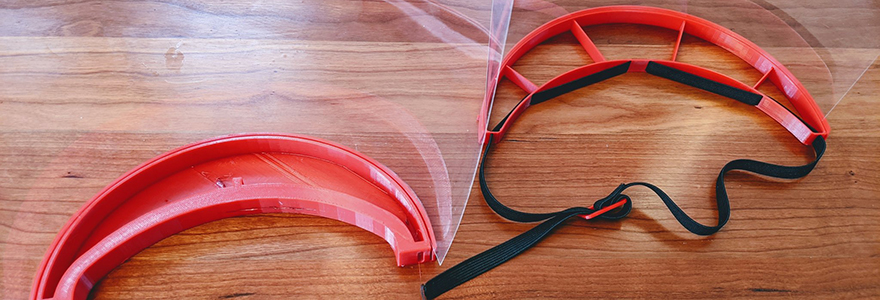Feature: Using technology and ingenuity to protect health care workers

By Crystal Mackay
Dr. Tarek Loubani is using his experiences as an emergency physician in Gaza and here at home in London to help supply personal protective equipment to health care workers Canada.
As the COVID-19 outbreak progresses, there is concern about the adequate supply of personal protective equipment like masks, gowns, and face shields.
Dr. Loubani has created a template to create 3D-printed medical supplies, specifically face-shields and sterilizable stethoscopes to reduce virus transmission for health care workers. An emergency room physician at London Health Sciences Centre, Dr. Loubani says they are bracing for the worst.
“My colleagues in the emergency department are brave and determined to keep our fellow Canadians as safe as possible throughout this. We know this will be hard, however, what I see around me is a dignity and courage often seen in the trenches of any battle, despite the dangers they face,” he said.
He says the similarities between the current situation and his experiences in Gaza made him realize he could translate those skills here at home. While in Gaza, there were days he was sharing his one stethoscope with ten other doctors who were trying to treat more than 100 patients.
“We weren’t just low on medical supplies, but even the basics, like stethoscopes, were totally missing,” said Dr. Loubani, an Associate Professor at Western’s Schulich School of Medicine & Dentistry and emergency room physician at London Health Sciences Centre.
That spurred him to find a way to help health care providers create their own supplies on site by creating an open-access template for a 3D-printed stethoscope that could be created using recycled plastic.
Now, he’s taking that same idea and translating it to create protective face shields for front line health workers in the midst of the COVID-19 pandemic.
“We are in a moment where traditional supply lines are breaking down. That's where local manufacturing technologies like 3D printing really shine. We can use local resources to construct these supplies in time without depending on everything along a complicated supply chain to be working and intact,” he said.
He and a team at his medical supplies charity, the Glia Project, have designed a face shield that is made from 3D plastic parts, Mylar and elastic. The shield covers the whole face, protecting the nose and eyes from droplets that may contain the virus. They are printed in a Health-Canada approved facility that was inspected late last year.
“I was in the emergency department, realizing just how short we already were on personal protective equipment. And we haven't even come close to our peak; what will it look like in three weeks? So, we decided to go full speed and produce,” said Dr. Loubani.
So far, they’ve produced hundreds of the face shields with a focus on providing supply to local health care providers here in London.
“We're sons and daughters of the emergency department and the hospital,” he said. “So, what we're doing here is just making sure that our colleagues and friends are protected.”
They also hope to be able to provide hospitals across Canada with the technology, design and instructions to make their own. The most efficient way to do that is for them to create the face shields themselves using their own printers in their own centres if they have them. They may also get some assistance from those who have the fluency with the technology to be able assist. The files are all free and open-source.
“Are we scared? Of course. We all have families and friends and also worry about ourselves. But all of us came into medicine for moments like these: the moments of hardship that truly matter,” he said.








